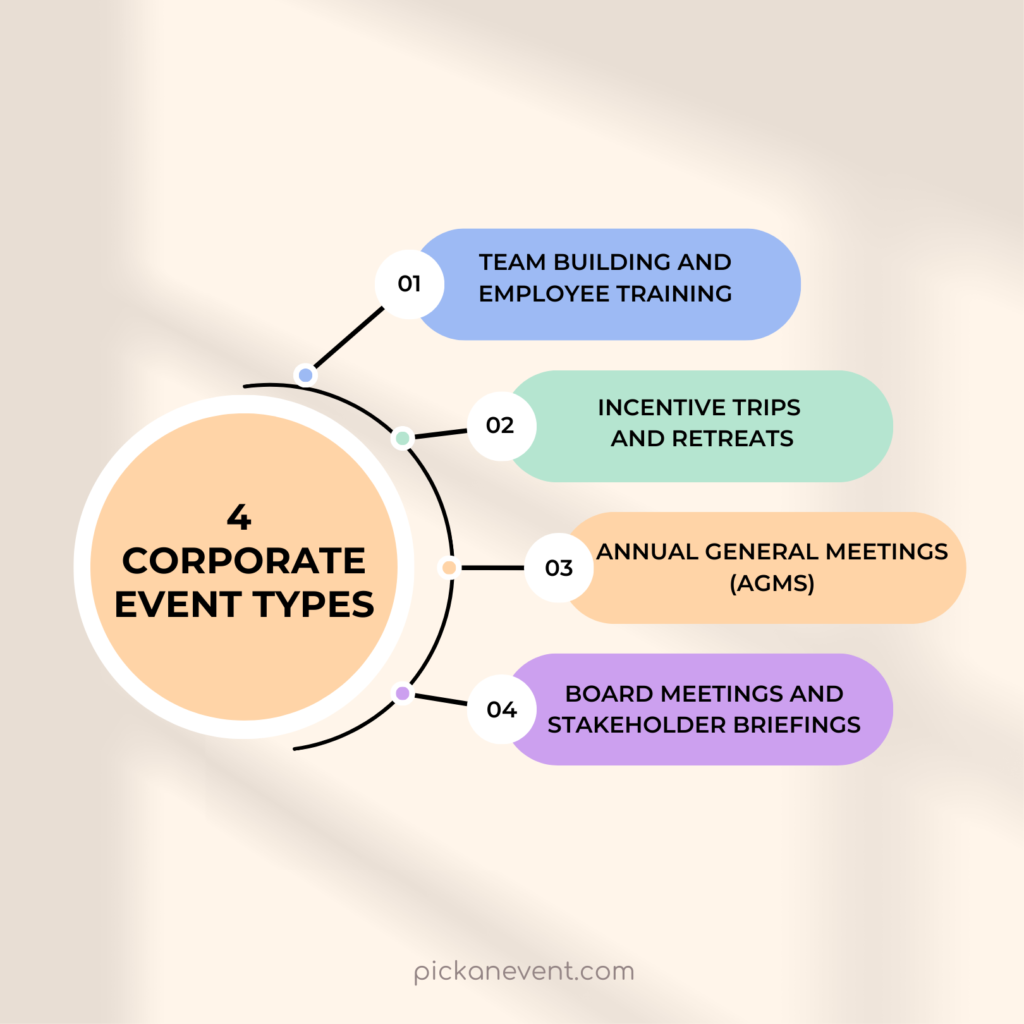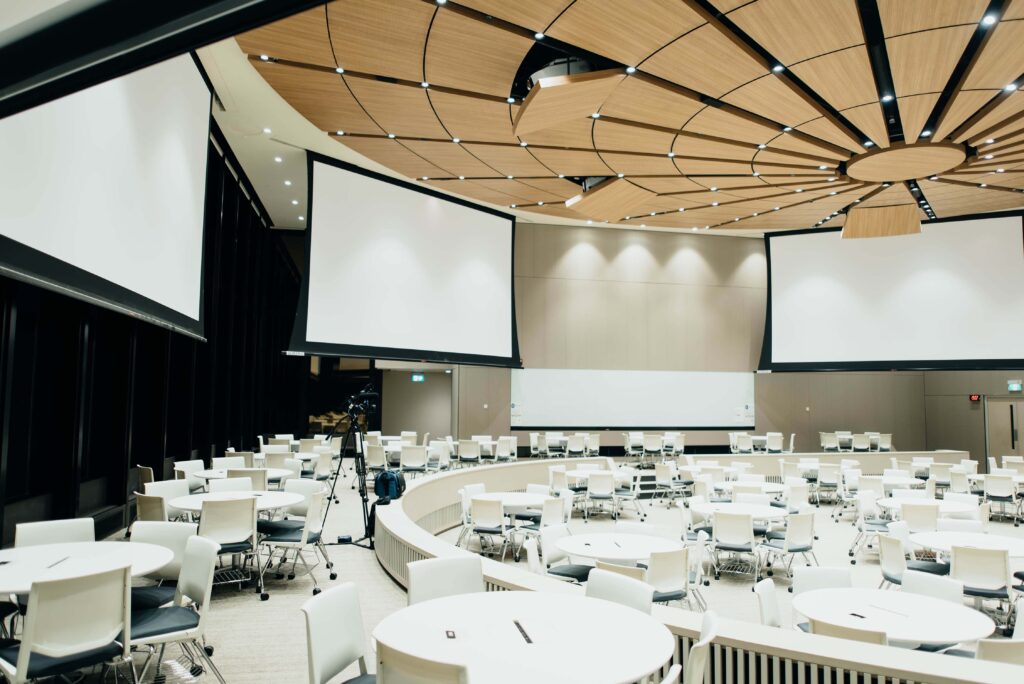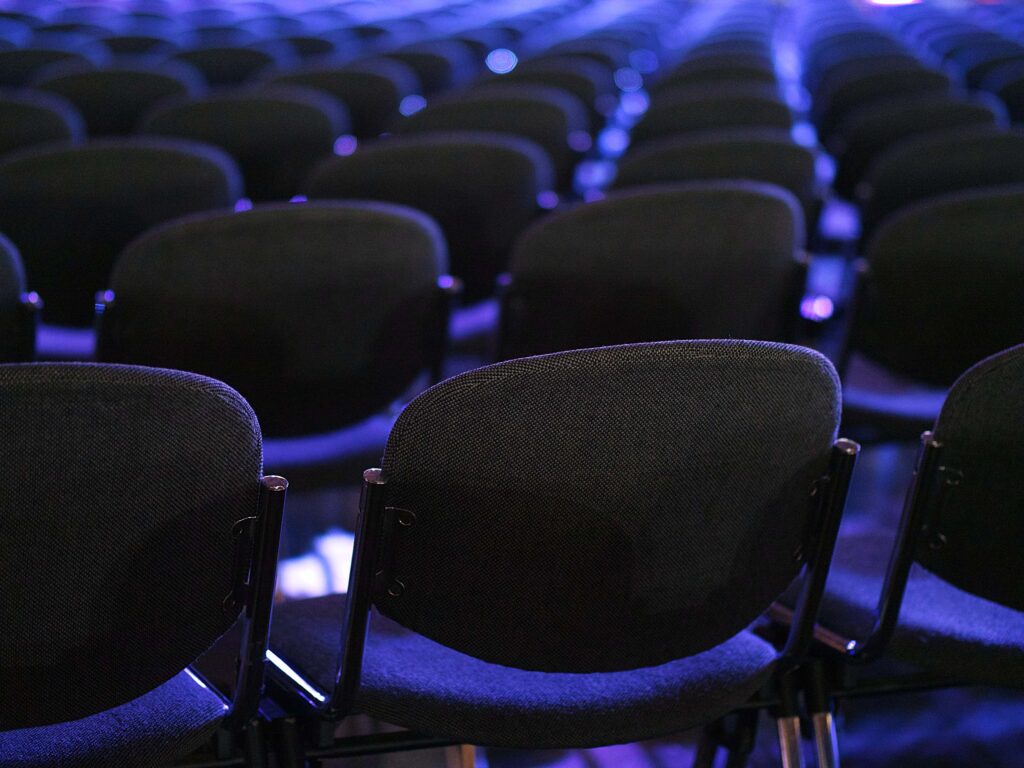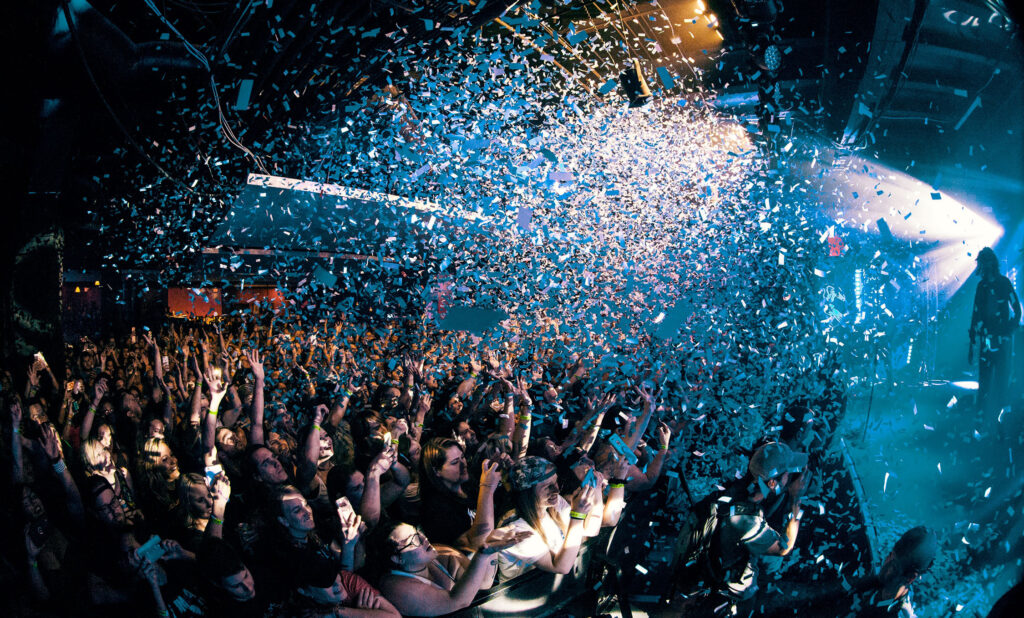Dear beginner event planners. Are you feeling lost with so many different types of events?
Don’t let this get you down.
Here, we’ll give you the most common types of events and a quick rundown of each. Think of it as your guide to finding the perfect event, whether you’re planning one yourself or just looking for something fun to do.
Ready to become an event guru? Let’s get started!
Table Of Contents
4 Corporate Event Types

#1 – Team Building and Employee Training – Types Of Events
Team Building and Employee Training are special occasions organized within a company to help employees work better together and become more skilled in their roles.
During team building activities for work, employees engage in interactive activities that require cooperation, problem-solving, and effective communication. Just like in a relay race, each team member passes the baton smoothly to the next, ensuring a successful finish.
Moreover, employee training sessions are like tool kits given to employees to help them sharpen their skills and perform their jobs better. Employees learn new techniques, strategies, or technologies that can be applied in their roles, making them more proficient and productive.
#2 – Incentive Trips and Retreats – Types Of Event
These events involve taking employees to exciting destinations or serene retreats where they can relax, rejuvenate, and celebrate their achievements. It’s like a mini-vacation but with a purpose – to thank employees for their efforts and boost their motivation to keep doing great work.
#3 – Annual General Meetings (AGMs) – Types Of Events
Annual General Meetings (AGMs) are like a yearly report card for a company. Just like how students gather to review their academic performance and set goals for the next year, companies hold AGMs to discuss how well they’ve been doing and where they want to go in the future.
During AGMs, company leaders provide updates on the financial health of the company, future plans, and strategies. Shareholders get to ask questions and share their thoughts, making AGMs an essential event to maintain transparency and strengthen the company-family bond.

#4 – Board Meetings and Stakeholder Briefings – Types Of Events
Board Meetings and Stakeholder Briefings involve in-depth discussions about the company’s direction, performance, risks, and opportunities.
It’s like chess, where each move is crucial and needs careful thought. Just as players analyze the game and plan their next moves, company leaders analyze data and plan the company’s moves for success. Sharing these plans with stakeholders is like showing the game plan to fans – it keeps everyone informed and excited about the journey ahead.
6 Types Of Business Events
Business events encompass a wide range of gatherings that serve professional and commercial purposes. Here are different types of business events:
#1 – Networking Events – Types Of Events
Networking Events are designed to help people connect and build relationships with others in their field or related fields. In these events, you’ll find various formats like business mixers, meetups, and speed networking events.
- Business mixers are like a big party for professionals, where you can chat, exchange business cards, and get to know each other.
- Meetups are more focused gatherings where people with common interests or professions come together to discuss specific topics.
- Speed networking is like a mini-interview, where you get a short time to talk to someone before moving on to the next person.
#2 – Business Conferences – Types Of Events
Large-scale events where professionals gather to discuss industry trends, innovations, best practices, and future directions. They often feature keynote speakers, panel discussions, and workshops.
#3 – Trade Shows and Exhibitions – Types Of Events
Events that allow businesses to showcase their products, services, and solutions to a targeted audience. These events often attract potential clients, partners, and investors.
Just like visitors to a museum appreciate art, visitors to trade shows appreciate innovation and new business offerings. It’s a great way for businesses to make a splash and get noticed.
#4 – Product Launch Events – Types Of Events
Occasions are specifically organized to introduce new products or services to clients, stakeholders, and the public. They aim to create excitement and generate interest in the offering.

#5 – Sales and Marketing Workshops – Types Of Events
These workshops are focused on improving strategies, skills, and techniques related to sales and marketing plans. They are invaluable for businesses and professionals aiming to enhance their market presence and increase revenue.
#6 – Business Dinners and Luncheons – Types Of Events
Business dinners and luncheons are like friendly get-togethers but with a professional twist. These events are more relaxed and social, providing a perfect setting for networking, building relationships, and discussing business matters.
7 Non-corporate Event Types
#1 – Weddings – Types Of Events
Just like the opening of a grand play, weddings mark the union of two individuals in marriage, a promise to stand by each other through thick and thin. These celebrations typically consist of ceremonies, where vows are exchanged and promises are made, symbolizing love and commitment.
#2 – Parties and Celebrations – Types Of Events
Parties and Celebrations are like joyful chapters in a book, each marking a special occasion in one’s life. They are gatherings held for various occasions like birthdays, anniversaries, graduations, and other personal milestones.
Read More:
#3 – Festivals and Fairs – Types Of Events
Festivals and Fairs are like cultural or community events featuring entertainment, food, games, and activities, often celebrating traditions or specific themes.
#4 – Fundraisers and Charity Events:
Fundraisers and Charity Events are like helping hands reaching out to those in need. These events are organized to make a difference in the lives of others. It’s like a collective effort to create a better world.
The main goal of these events is to raise funds and support for a particular cause, nonprofit organization, or community initiative.
#5 – Exhibitions and Art Shows:
Events showcasing artworks, crafts, or specific themes to promote artistic talent and creativity. Just like a journey through an art museum, these events inspire and captivate the soul.
#6 – Sports Events and Tournaments:
Sports Events and Tournaments are like battlefields where athletes and teams showcase their skills and competitive spirit.
These events attract both participants and spectators, creating an electrifying atmosphere. The cheers of the crowd, the adrenaline rush, and the display of talent make it a memorable experience. Just like a match-winning goal, these events leave a lasting impact and a sense of achievement.
#7 – Concerts and Music Events:
Live performances by musicians, bands, or artists provide entertainment and enjoyment to music lovers. The energy, the crowd singing along, and the passion of the performers make these events truly unforgettable.

Key Takeaways
Different event types make life more delightful and interesting. From farewell parties to music festivals, they’re an excellent way to connect, celebrate, and create lasting memories.
P/s: But what if you could make your events more fun and engaging? Try using AhaSlides, an interactive platform that enhances event experiences, ensuring active participation and enjoyment for attendees. Your guests will thank you!
More tips and advice about events? Pick an event that you’re concerned with, and we’ll help you!
FAQs
What are the four categories of events?
Four categories of events are Corporate Event Types, Business Events, Non-corporate Event Types, and Social Events.
What are the 7 elements of event?
Theme/Concept: The central idea or purpose of the event.
Venue: The location where the event takes place.
Audience: The individuals or groups attending the event.
Program: The scheduled activities or agenda for the event.
Logistics: The practical arrangements and technical aspects to facilitate the event.
Marketing and Promotion: Strategies to attract and inform attendees about the event.
Event Budget and Finance: The financial planning and management for the event.
What are the six major components of an event?
Event Objective and Purpose, Target Audience, Program and Activities, Logistics and Operations, Promotion and Marketing, Budget and Finances.





